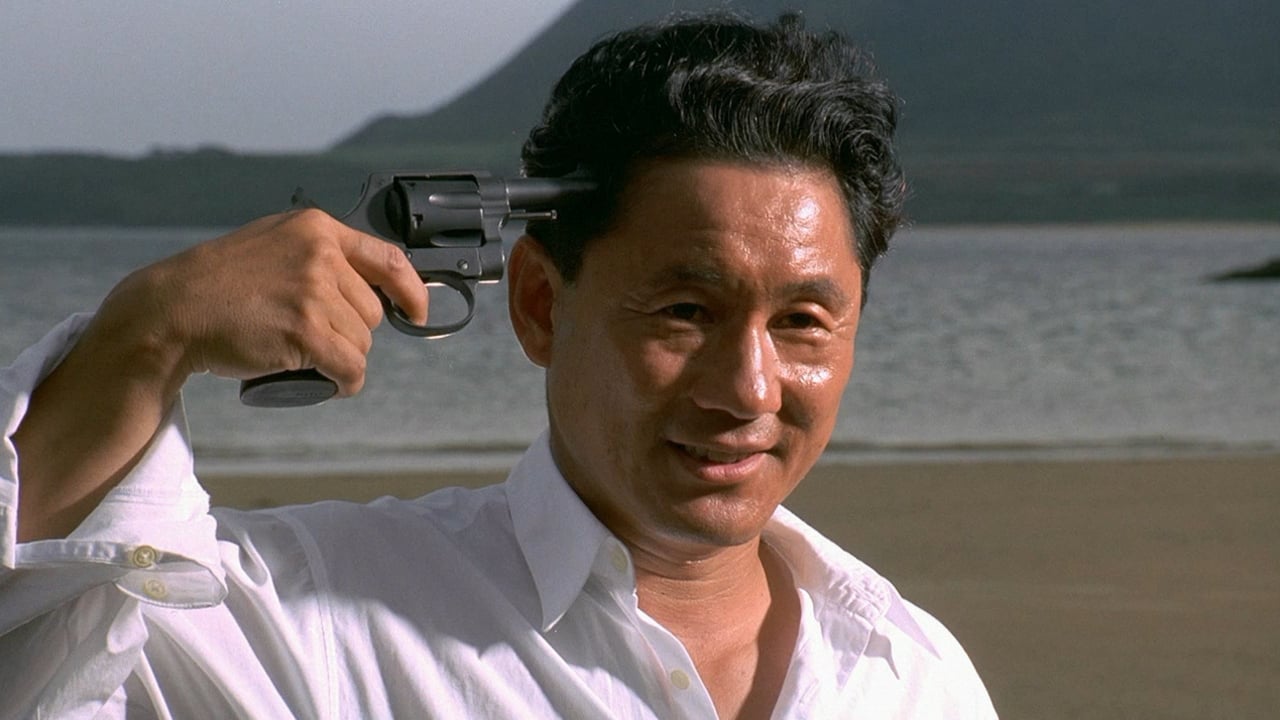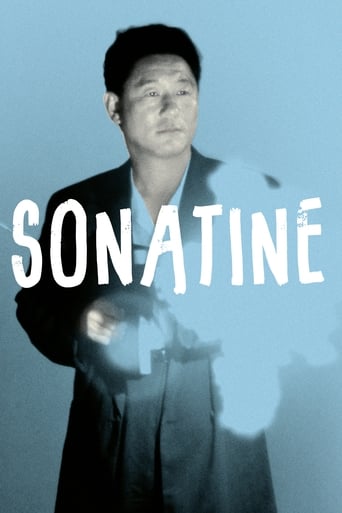



Sorry, this movie sucks
Dreadfully Boring
It really made me laugh, but for some moments I was tearing up because I could relate so much.
View MoreI think this is a new genre that they're all sort of working their way through it and haven't got all the kinks worked out yet but it's a genre that works for me.
View MoreWell this is the third and final film in the 'Beat' Takeshi trilogy that I picked up on DVD, the first two being VIOLENT COP and BOILING POINT. SONATINE is the best of the trilogy, the most mature and the film with the best atmosphere. Despite the violent shenanigans of the film's plot, involving rival gangsters killing each other, for the most part this is a tranquil outing shattered only by bursts of extreme violence. It's also a film with a lot of humour, most of it utterly surreal (such as when two wrestlers become toys thanks to some sped-up camera effects). For most of the film, it's simply a bunch of guys having fun at a beach house, by pulling pranks on each other and playing games. Despite that the film never becomes boring because there's a simmering undercurrent of violence that you know has to erupt at some point.Once again the presence of 'Beat' Takeshi lifts the movie another level and the whole film hinges on his outstanding performance. This time he's a typical gangster, plagued with a hidden desire to kill himself. Takeshi has mastered the Japanese 'cold face' well yet it's also a pleasure to see him in some warmer moments as I get the feeling he isn't such a nasty character this time around – certainly not like the rapist he played in BOILING POINT. The supporting cast is very good indeed and the photography on the film is excellent. The violence, in the form of bloody shoot-outs, is nothing new, yet executed with a certain level of finesse that makes it stand out. Watch out for the shoot-outs where time (and the characters) literally stand still as fates are meted out. Add lots of bizarre stuff going on, Japanese humour, and a great twist ending, and you have what amounts to a nice, unusual little film.
View MoreMurakawa is a Yakuza who is sent to Okinawa by his boss, Murakawa suspects that this is a set-up but he goes anyway. When he gets to Okinawa with his crew he finds that things are worse than he previously thought two Yakuza clans are at war. Murakawa dispatches a group through a gun fight and hides out in a beach house with his remaining soldiers.I've known about Kitano's legacy and so decided to watch 'Brother' his American debut....I found it quite boring and well, a disappointment and so I decided to check out his earlier stuff...and let's just say that I consider him one of the greats..minus 'Brother' which was clearly made for American audiences and required Kitano to abandon what made him great...his weird humour.Sonatine at first starts off as a typical gangster movie, you have the gangsters and their traditions with violence following and then the film takes a turn. The Yakuza's are left to their own devices having to entertain themselves in a remote beach house, I found this hilarious as Murakawa a man broken by years of violence and unhappiness (My own interpretation) finds a little ray of sunshine as he 'hangs out' with his gang on a friend basis rather than a boss, course then comes the highlight of the film the beautiful Aya Kokumai who falls in love with Murakawa...And then violence follows one more, only this time the violence is truly justified.My favourite scene is when Murakawa waits for Katagiri and the other guy to fall into his 'trap'...Absolutly hilarious and then there is the brilliant sumo scene! Just wow...It's truly a masterpiece of Japanese cinema.
View MoreTakeshi Kitano has a really strange but oddly touching mind when it comes to making movies. I've only seen two at the moment, this and Zatoichi, but they reveal a filmmaker who is so not content with doing something "normal" in the genre and at the same time has something relating to respect for the formal attitudes with what he's doing. This isn't a crazy Yakuza movie, for example, in the vein of a Takashi Miike. There's a far more sinister and just flat out cold core that Kitano wants to reach with Sonatine, and it's not through going for an outlandish visual style. It's maybe closer to minimalism, but then that's not entirely correct either. The closest one sees to how detached, if that's the term, Kitano makes his characters, just watch the scene where the yakuza have the one member tied to the crane and dip him slowly, agonizingly into the water, pull him up, and dunk him again. The way this is shot, edited, acted, all refers to the tone of the piece. Kitano may not play by the "rules", if there are any, but it's exciting to see him go in unexpected directions.If you're expecting what the video-case is advertising (i.e. the not quite correct comparison as "Strongly reminiscent of Goodfellas"), you'll be thrown for a loop, and possibly not in the way you'd like. But if one meets Kitano half-way, then there's ample room to be absorbed in these characters. This is important, and maybe the one thing right about comparing to Goodfellas, which is that Kitano has here some very curious characters, and only worries about a semblance of plot from time to time. We're given a host of gangsters, led by Murakawa (Kitano), who have to hide out for a while at some remote cabin by a beach while a gang-war is brewing. At first, it appears liken Kitano is making a standard if very oddly interesting genre piece, with a beating in a bathroom, a shooting at a bar, and some of the usual curses flying and men in suits talking of business affairs.But even in these early scenes something doesn't feel quite realistic, despite the appearances of the ordinary. Just watching that shootout at the bar, everything seems kind of calm, however a surprise, when the bullets start flying and Murakawa and his guys shoot against some rivals. They look placid, not excited or with the usual amount of adrenaline flowing. After this, the story moves to that big middle chunk of the picture, where Murakawa and the others have a kind of playful attitude with things. What may appear to be meandering on the part of Kitano here is actually part of the point: they play Russian roulette, they do sumo wrestling (this part is especially crazy in fast-motion and music all wacky), they put on some mock plays, and Murakawa gets closer to a woman (Kokumai) who he saved from a rape. All the while we see Murakawa enjoying himself, smiling, laughing, going along with the thugs who simply want a good strong shower, trying to block out the inevitable- going back to the impending gang war.In a sense with Kitano and Sonatine, it's not what's there but what isn't. When violence occurs we get to see the blood, but it's not frantic; blood flows for a moment and we see little struggle (save for the one guy in the back of the car, which I won't say much more to spoil). I'm even reminded of Jean-Pierre Melville in how Kitano treats his "hero" in the final act, how things get even colder and more fragmented in Murakawa's mind, and yet one can't take their eyes away from the mood of it all. There's something extreme about Sonatine, and it's mostly under the surface, and it reveals a cruel and dark but also lighthearted side of Kitano that is extraordinary (apparently, he was in a very depressed state when creating it, which almost makes it like an act of cinematic purging of his soul). While it veers into being mundane in one or two scenes, and a couple of performances don't quite work, just watching Kitano and his placid profile, occasionally breaking into a smile like when he mentions killing his father as a teenager, is enough to merit it a worthwhile experience. In fact, it's almost on par with the excellence of Zatoichi, and in its own way more ambitious.
View MoreWell first of all kitano started a new genre of movie making with sonatine .I would like to propose a takeshi kitano trilogy to anyone new to his movies First would be violent cop(directed in 1989) .then comes sonatine(directed in 1993) then comes hana-bi(directed in 1997) ..Well the greatness about kitano's movies is that they show the state of his mind they are truly personal ..violent cop being his earliest effort is very raw hana-bi being a later effort was extremely well polished and complete but sonatine was directed at a time when kitano was contemplating suicide It shows the disturbed state of his mind ..It is like a modern version of Samuel Beckett's "waiting for Godot" .minimalistic dialog philosophical long shots and bursts of violence .I think it depicts the state of a mind driven to an edge......You watch this movie when you are happy you perceive it differently you watch it when you are sad you will perceive it differently .It remains in your memory long after the final scene ..It is a visceral experimentation with a subject which movies rarely touch, suicide It is kitano at his best and according to me the one of the greatest movies of the nineties And the background track from Joe hisashi mesmerizing ..All in all if someone cannot appreciate this movie then they it means they cannot appreciate art ..Their minds are so consumed by the commercial formulaic jargon(manufactured emotions and exaggerated relationships) coming out of the stables of large film industries like :- Hollywood, hong Kong(martial arts wi-fi flicks) etc. that they cannot appreciate true gems like this one .Finally this movie was a commercial failure in Japan (even Japanese themselves find it hard to appreciate Kitano) ..But when it was shown to famous French film critic Alain Delon , He was taken aback by kitano's acting and is quoted to have said :- "what's THAT? [...], this is not an actor [...], he only got three facial expressions and he almost doesn't talk on top of this". At the same time he was both fascinated and puzzled by this new genre of movie making. Finally In 1995, Sonatine entered the 13th Festival Du Film Policier De Cognac (Thriller Film Festival of Cognac) in France, where it was critically acclaimed and got some recognition it truly deserved .I would give this movie a ten on ten thank you ..
View More